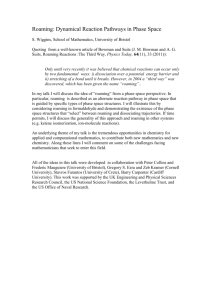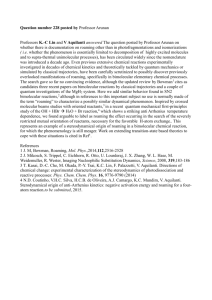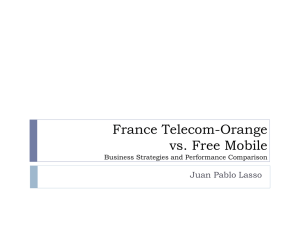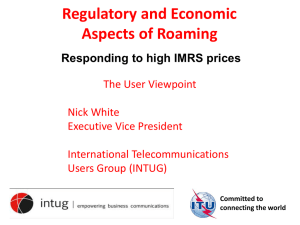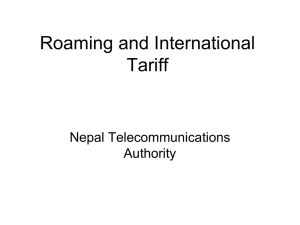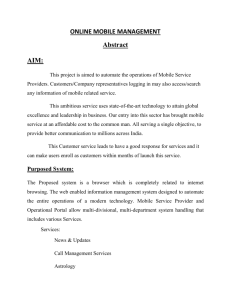Document 1 – E 9 May 2012 Original: Spanish TELECOMMUNICATION
advertisement
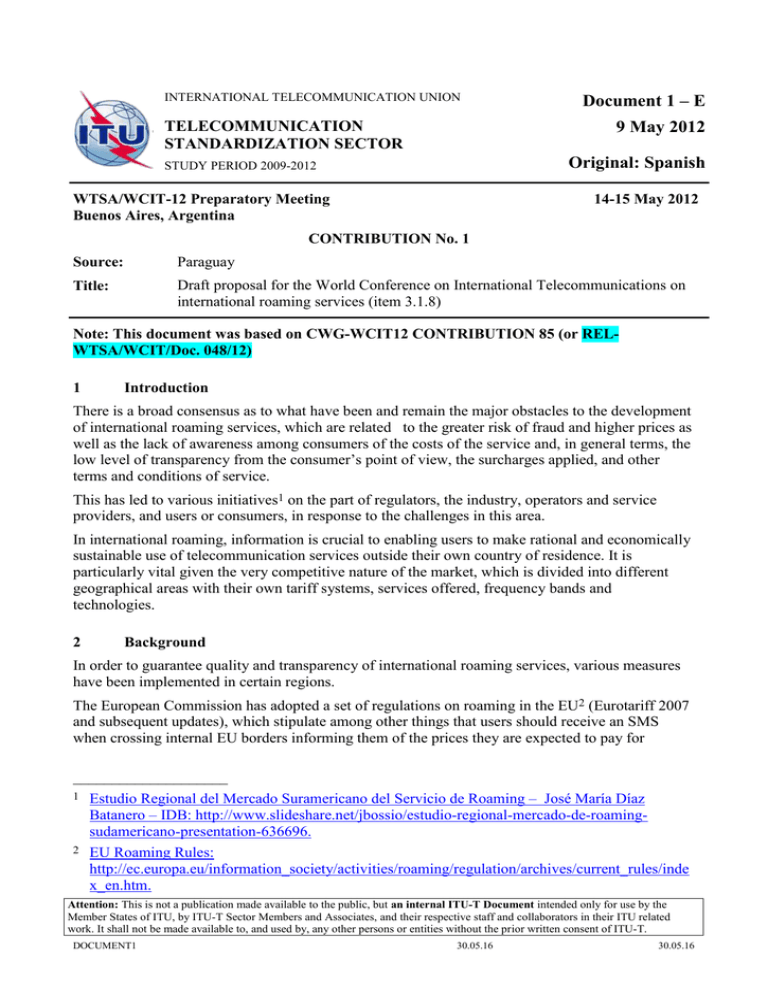
INTERNATIONAL TELECOMMUNICATION UNION TELECOMMUNICATION STANDARDIZATION SECTOR Document 1 – E 9 May 2012 Original: Spanish STUDY PERIOD 2009-2012 WTSA/WCIT-12 Preparatory Meeting Buenos Aires, Argentina 14-15 May 2012 CONTRIBUTION No. 1 Source: Paraguay Title: Draft proposal for the World Conference on International Telecommunications on international roaming services (item 3.1.8) Note: This document was based on CWG-WCIT12 CONTRIBUTION 85 (or RELWTSA/WCIT/Doc. 048/12) 1 Introduction There is a broad consensus as to what have been and remain the major obstacles to the development of international roaming services, which are related to the greater risk of fraud and higher prices as well as the lack of awareness among consumers of the costs of the service and, in general terms, the low level of transparency from the consumer’s point of view, the surcharges applied, and other terms and conditions of service. This has led to various initiatives1 on the part of regulators, the industry, operators and service providers, and users or consumers, in response to the challenges in this area. In international roaming, information is crucial to enabling users to make rational and economically sustainable use of telecommunication services outside their own country of residence. It is particularly vital given the very competitive nature of the market, which is divided into different geographical areas with their own tariff systems, services offered, frequency bands and technologies. 2 Background In order to guarantee quality and transparency of international roaming services, various measures have been implemented in certain regions. The European Commission has adopted a set of regulations on roaming in the EU2 (Eurotariff 2007 and subsequent updates), which stipulate among other things that users should receive an SMS when crossing internal EU borders informing them of the prices they are expected to pay for ____________________ 1 Estudio Regional del Mercado Suramericano del Servicio de Roaming – José María Díaz Batanero – IDB: http://www.slideshare.net/jbossio/estudio-regional-mercado-de-roamingsudamericano-presentation-636696. 2 EU Roaming Rules: http://ec.europa.eu/information_society/activities/roaming/regulation/archives/current_rules/inde x_en.htm. Attention: This is not a publication made available to the public, but an internal ITU-T Document intended only for use by the Member States of ITU, by ITU-T Sector Members and Associates, and their respective staff and collaborators in their ITU related work. It shall not be made available to, and used by, any other persons or entities without the prior written consent of ITU-T. DOCUMENT1 30.05.16 30.05.16 -2- making and receiving calls, and that they should be able to obtain more detailed information by means of a voice call or SMS. The Arab Telecommunications and Information Council of Ministers adopted Resolution 187 of 2006, according to which all operators must inform roaming users of applicable tariffs via SMS once they arrive at their destination, and Resolution 219 of 2008, which endorses the recommendations of the Arab Regulators’ Network (AREGNET) on measures to increase transparency of roaming charges including the use of a website.3 The industry for its part has also made efforts, for example GSMA Europe,4 which adopted a code of conduct concerning information on roaming charges which promotes the provision of information via a customer care site and a corporate website. GSMA (Arab region)5 uses the same means as well as text messages. In February this year, the Council of the Organisation for Economic Co-operation and Development (OECD)6 recommended measures including measures to promote transparency of information on roaming services. In the light of the above, recognizing the challenges facing all States with regard to international roaming services and the transnational dimension of those services, the need to raise awareness among users and operators of the costs of these services and the availability, advantages and diversity of providers, and in order to guarantee transparent and effective protection for users, it is essential to agree certain minimum measures as regards quality and transparency of information on these services. 3 Proposal The Member States of CITEL accordingly propose to the World Conference on International Telecommunications (WCIT-12) the addition of a new Article 4.X to the International Telecommunication Regulations, as follows: “Agreements between administrations** for the provision of international roaming services shall stipulate that such services are to be: – provided to visiting users with a level of quality comparable to that provided to their own users; – accompanied by promptly available and clear information on how to access the services and the prices thereof. Mechanisms shall also be put in place to enable compliance with the above provisions to be monitored.” ______________ ____________________ 3 Proposals of the AREGNET Working Group on International Roaming: http://www.tra.org.bh/en/pdf/Presentation_Background_Roaming-MOU.pdf. 4 http://www.eesc.europa.eu/self-and-coregulation/documents/codes/private/039-private-act.pdf. 5 http://www.gsmaw.org/documents/gsme_coc_int_roaming.pdf. 6 http://webnet.oecd.org/OECDACTS/Instruments/ShowInstrumentView.aspx? InstrumentID=271&InstrumentPID=276&Lang=en&Book=False. Recognized operating agencies. ** DOCUMENT1 30.05.16 30.05.16

